SBTT, FCI Earnings Decline Amid Economic Headwinds
HIGHLIGHTS
SBTT HY2020
- Earnings: EPS down 30.1% from $2.97 to $2.08.
- Performance Drivers:
- Lower Revenue from COVID-19 measures (waiver of fees, lower interest rates etc.)
- Higher impairment costs
- Outlook:
- Constrained Revenue Growth
- Challenging domestic environment.
- Discontinuation of ScotiaLife Trinidad and Tobago Limited sale to SFC
- Rating: Maintained at NEUTRAL.
FCI HY2020
- Earnings: EPS down 137.3% from a profit of TT$0.50 to a loss of TT$ 0.19
- Performance Drivers:
- Extraordinary or one-off costs arising from the COVID-19 pandemic
- Higher impairment charges
- Outlook:
- Potential headwinds due to GDP contractions in majority of operating jurisdictions.
- Potential increase in Credit Loss Expense.
- Rating: Maintained at NEUTRAL.
This week, we at Bourse review the financial performance of two Banking stocks FirstCaribbean International Bank Limited (FCI) and Scotiabank Trinidad and Tobago Limited (SBTT) for the nine-month period ended July 31st, 2020. Both SBTT and FCI reported lower earnings, heavily influenced by the muted top-line growth and higher provisioning for credit losses from the economic fallout of COVID-19.
Scotiabank Trinidad and Tobago Limited (SBTT)
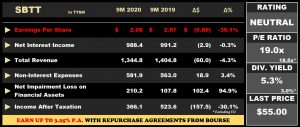
SBTT reported an Earnings Per Share (EPS) of $2.08 for the nine months ended July 31st 2020 (9M 2020), down 30.1% from $2.97 recorded in the prior comparable period.
Net Interest Income stood at $988.4M in 9M 2020, marginally lower at 0.3%, from $991.2M in 9M 2019. Other Income, was more severely impacted falling 13.8%, from $413.5M in the prior period to $356.4M in the current. Consequently, Total Revenue recorded a 4.3% year on year (YoY) decline moving to $1.34B from a previous $1.40B. Non-Interest Expenses rose 3.4% amounting to $581.9M. In accounting for adverse economic conditions, Net Impairment Loss on Financial Assets was reported at $210.2M in 9M 2020, 94.6% greater than $107.8M recorded in the prior year period. Impacted by higher credit loss expenditure and lower revenue, Income Before Taxation fell 24.7% moving to $552.6M from $733.9M in the prior year. Income Taxation Expense was $186.5M. Overall, Income After Taxation amounted to $366.1M, 30.1% lower than $523.6M recorded in the previous comparable period.
Revenue Lower
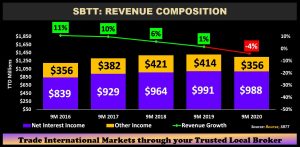
SBTT’s top-line consists of two revenue segments, Net Interest Income and the more broadly defined Other Income. Net Interest Income which contributes roughly 73% of Total Revenue, recorded a marginal decline of 0.3% relative to the prior year, likely impacted by softened demand for new loans. Other Income recorded a 13.8% YoY decline, affected by SBTT’s COVID-19 led decision to reduce credit card rates, waive loan fees and penalties for late payments. With economic pressures expected to linger in the near term, SBTT is likely to continue to face headwinds to top line growth in the upcoming periods.
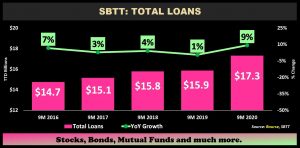
SBTT recorded a 9% uptick in its loan portfolio over the prior comparable period, likely supported by stronger growth in the earlier months of 9M 2020. Loans and advances to Banks and Companies grew 31.0% relative to the previous period and Loans to Customers advanced 8.5%. Resultantly, both segments of Total Loans resulted a $1.5B YoY increase.
On a quarterly basis, the Total Loans portfolio shrunk 1.8%, illustrating short term declines in the demand for loans due to the COVID-19 related economic pressures. With the domestic economy facing business closures and exacerbated unemployment rates, the banking industry could continue to be impacted on two fronts: i) increased impairment/credit losses and ii) stagnated demand for banking solutions.
The Bourse View

SBTT is currently priced at $55.00, 9.8% lower year-to-date. The stock trades at a Trailing Price to Earnings ratio of 19.0 times, in line with the Banking Sector average of 18.5 times (excluding FCI) and offers investors a Trailing Dividend Yield of 5.3%, higher than sector average of 3.0% (3.4% including FCI). SBTT paid a third quarter dividend of $0.40 per share, 20% lower than the $0.50 per share paid in the prior comparable period. On the basis of consistent dividend payments and fair valuations but tempered by ongoing adverse economic conditions, Bourse maintains a NEUTRAL rating on SBTT.
FirstCaribbean International Bank Limited (FCI)

FCI reported a Loss per Share (LPS) of TT$0.19 for the nine-months ended 31st July, 2020 (9M 2020), as compared to the Earnings per Share (EPS) of TT$0.50, in the previous year.
Total Revenue amounted to TT$2.9B, 5.0% lower Year on Year (YoY), while Operating Expenses increased 0.8% from TT$2.01B to TT$2.03B. The Bank’s Credit Loss Expense on Financial Assets was significantly higher, moving from a gain of TT$4.0M to a Loss of TT$850.9M. Impairment of Intangible Assets amounted to TT$339.5M, a one off expense arising from the Bank’s decision to write down the carrying value of its Goodwill. Consequently, the Bank reported a Loss Before Taxation (LBT) of TT$289.0M as compared an Income Before Tax (IBT) of TT$1.1B in 9M 2019. Overall, Net Loss for the Period amounted to TT$288.4M relative to the Net Income for the Period of TT$818.9M in the previous year. Net Loss attributable to Equity holders was reported at TT$291.9M, TT$1.1B lower than the comparable period.
Revenue Slips
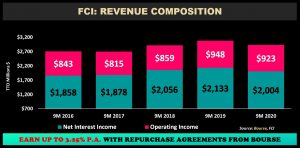
FCI’s Total Revenue trended lower in 9M 2020 after increasing for 3 consecutive periods, declining 5% YoY. Net Interest Income, FCI’s largest revenue contributor (9M 2020 Revenue: 68%) contracted 6.0% YoY. With FCI’s primary operating jurisdictions being heavily dependent on Tourism, demand for and the ability to qualify for loans may be constrained in the coming periods, which could weigh on FCI’s top line. Similarly, Operating Income (9M 2020 Revenue: 32%) declined 2.7% in 9M 2020 and may face continued pressures going forward as an environment of lower disposable income and muted economic activities could potentially restrict the opening of new/continued operations of accounts and investment decisions.
Operating Segment Contracts

FCI recorded a 74.6% YoY decline of PBT in 9M 2020. This precipitous decline is primarily attributable to subdued revenue growth, higher provisioning for potential credit losses and a non-cash impairment charge on FCI’s Goodwill, to facilitate higher potential losses under current economic circumstances. The Bank’s largest contributor to PBT Growth, Corporate and Investment Banking, contracted by 42.2% on account of high volatility and disruptions in financial markets, specifically in the second quarter on 2020. Likewise, Wealth Management, which was historically FCI’s smallest contributor to PBT (9M 2019: 13.8%) now accounts for the 2nd highest portion of PBT (9M 2020: 39.9%) and fell 26.3% YoY. Retail and Business Banking declined 172.9% YoY to record a Loss Before Tax of TT$207M.
The Bourse View
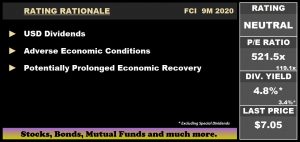
At a current price of TT$7.05, FCI trades at a Trailing Price to Earnings ratio of 521.5 times, significantly above the Banking sector’s average of 119.1 times (18.5 times excluding FCI). The stock also offers investors a Trailing Dividend Yield of 4.8% (6.6% including special dividends), above the Banking Sector’s average of 3.4%(3.8% including special dividends). Notably, FCI pays dividends in USD, providing a hedge against any potential devaluation of the TTD and access to Foreign Exchange in an environment of limited FX availability. FCI declared a third quarter interim dividend of TT$0.0125, payable on October 9th 2020.
FCI’s major operating jurisdictions Barbados (FY 2019 Revenue: 38%), The Bahamas (28%), The Cayman Islands (18%) and The Eastern Caribbean (11%) are heavily reliant on Tourism. With the IMF projecting a 5.4% economic decline for the Caribbean in 2020 and as conditions imposed by the COVID-19 pandemic continue to persist, FCI’s profitability may continue to face near term challenges. Despite slipping to (Tier 1) 12.6% and (Total Capital Ratio) 14.4% from its pre-pandemic level of 14.3% and 16.1% respectively, FCI’s capital adequacy remains above the applicable regulatory requirements.
On the basis of consistent USD dividend payments but tempered by reduced earnings, adverse economic conditions and potentially prolonged economic recovery in its operating jurisdictions, Bourse maintains a NEUTRAL rating on FCI.
“This document has been prepared by Bourse Securities Limited, (“Bourse”), for information purposes only. The production of this publication is not to in any way establish an offer or solicit for the subscription, purchase or sale of any of the securities stated herein to US persons or to contradict any laws of jurisdictions which would interpret our research to be an offer. Any trade in securities recommended herein is done subject to the fact that Bourse, its subsidiaries and/or affiliates have or may have specific or potential conflicts of interest in respect of the security or the issuer of the security, including those arising from (i) trading or dealing in certain securities and acting as an investment advisor; (ii) holding of securities of the issuer as beneficial owner; (iii) having benefitted, benefitting or to benefit from compensation arrangements; (iv) acting as underwriter in any distribution of securities of the issuer in the three years immediately preceding this document; or (v) having direct or indirect financial or other interest in the security or the issuer of the security. Investors are advised accordingly. Neither Bourse nor any of its subsidiaries, affiliates directors, officers, employees, representatives or agents, accepts any liability whatsoever for any direct, indirect or consequential losses arising from the use of this document or its contents or reliance on the information contained herein. Bourse does not guarantee the accuracy or completeness of the information in this document, which may have been obtained from or is based upon trade and statistical services or other third party sources. The information in this document is not intended to predict actual results and no assurances are given with respect thereto.”
